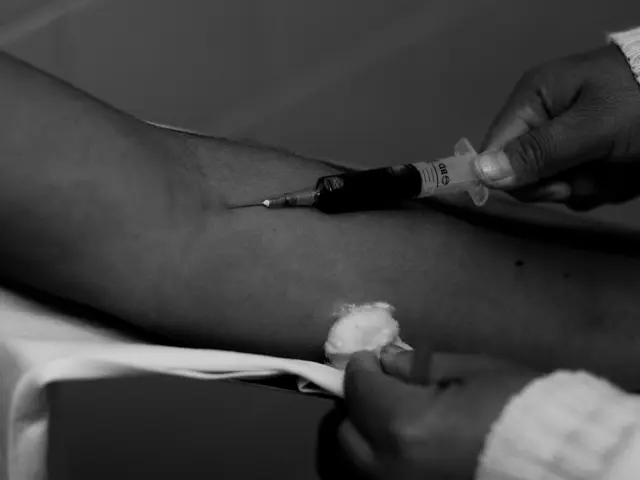Cancer Information: Varieties, Origins, Prevention Strategies, and Further Insights
In the ongoing battle against cancer, researchers around the globe are making significant strides in understanding the disease and developing new methods of prevention and treatment.
One such researcher is Prof. Dr. Jadwiga Jablonska from the University Hospital Essen, who is focusing on STAT3 signaling in neutrophils as a potential cause of cancer. Meanwhile, Christian Baumgartner from TU Graz is developing digital twin models for lung cancer, and Dr. Franz Kohlhuber, chairman of Deutsche Krebshilfe, is leading initiatives in prevention, patient-oriented oncology, and cancer research translation.
Cancer is a large group of diseases that occur when abnormal cells divide rapidly and can spread to other tissue and organs. The main cause of cancer is mutations, or changes to the DNA in your cells. These mutations can be inherited or occur after birth as a result of environmental forces.
External causes, called carcinogens, can include physical carcinogens like radiation and ultraviolet (UV) light, chemical carcinogens like cigarette smoke, asbestos, alcohol, air pollution, and contaminated food and drinking water, and biological carcinogens like viruses, bacteria, and parasites.
Certain risk factors may increase your chance of developing cancer, including tobacco use, high alcohol consumption, an unhealthy diet, lack of physical activity, exposure to air pollution, exposure to radiation, unprotected exposure to UV light, infection by certain viruses and bacteria, and some existing health conditions that cause inflammation.
If you have a family history of cancer or have a high risk of developing cancer, it is important to follow a doctor's screening recommendations. Early detection of cancer can increase the effectiveness of treatment and lower the mortality rate.
Clinical trials investigate new ways to treat cancer. One such approach is immunotherapy, which uses the body's own immune system to attack cancer cells. Another is hormone therapy, which removes or blocks hormones that fuel certain cancers to stop cancer cells from growing. Systemic drug treatments, such as chemotherapy, targeted therapy, and immunotherapy, can affect the entire body. Localized treatment for cancer involves using treatments like surgery or local radiation therapy at a specific area of the body or tumor.
Tumors can cause health problems, depending on where they grow in the body. Not all tumors are cancerous. Malignant tumors are cancerous and can invade other parts of the body. Stem cell (bone marrow) transplant repairs diseased bone marrow with healthy stem cells and is commonly used to treat leukemia.
Cancers are named for the area in which they begin and the type of cell they are made of, even if they spread to other parts of the body. Metastasis refers to cancer cells spreading through the bloodstream or lymphatic system to distant areas of the body. Metastatic cancers are often harder to treat and more fatal.
Palliative care involves relieving health symptoms associated with cancer, such as trouble breathing and pain. Alternative medicine may be used to complement another form of treatment and help decrease symptoms of cancer and side effects of cancer treatment.
It's important to note that about 33 percent of cancer deaths may be caused by tobacco, alcohol, high body mass index (BMI), low fruit and vegetable consumption, and not getting enough physical activity. Preventive measures to reduce the risk of developing cancer can include avoiding tobacco and secondhand smoke, limiting processed meat intake, maintaining a moderate body weight and BMI, doing regular moderate physical activity, staying protected from the sun, avoiding tanning beds, getting vaccinated against viral infections that can lead to cancer, and meeting with a doctor regularly for screenings.
In the fight against cancer, research, prevention, and treatment are all crucial components. With the work of dedicated researchers like Prof. Dr. Jadwiga Jablonska, Christian Baumgartner, and Dr. Franz Kohlhuber, as well as the commitment of individuals to adopt healthy lifestyle choices, we are one step closer to a cancer-free future.
Read also:
- Impact of a Government Shutdown on Citizens
- Medical Specialist Based in Visakhapatnam
- Individuals in New York afflicted by Legionnaires' disease have legitimate legal entitlements. Here's some essential information on the matter.
- Toxic Shock Syndrome: Signs, Origins, Tampon Connection, and Further Details








